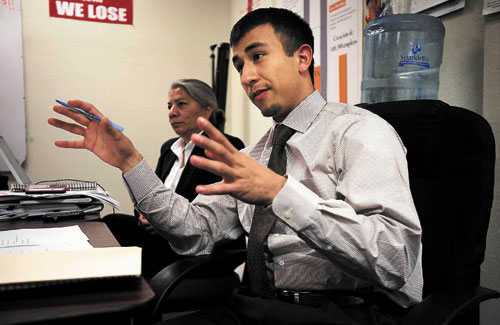Activists rally forces for immigration reform
Cynics might call it an exercise in futility, at least this year.
But count Michael Flores among the true believers: those convinced that with a lot of hard work, comprehensive immigration reform legislation could finally move forward in 2010, despite previous failures and the fact that Washington's attention is focused squarely on other issues.
"This is the time," said Flores, Southern Nevada director of Reform Immigration For America . "We're organized and we're not going to take no for an answer."
In November, Flores, 22, began leading the local arm of a national campaign to reform immigration laws in a way that will keep families together and provide a path to citizenship for the estimated 12 million illegal immigrants living in the United States.
His job includes lobbying congressional representatives and mobilizing the local Hispanic community and others concerned with getting immigration reform legislation passed. He's trying to get people as excited about the issue as they were in 2006 and 2007, when thousands participated in immigration reform marches in Las Vegas.
It's proven to be a difficult task.
Politicians have put the issue on the back burner in favor of such concerns as health care and the economy. Frustration among reform advocates came to a head after President Barack Obama's State of the Union address in January, during which he devoted a single sentence to immigration reform.
While advocates feel it is time politicians made good on their promises, getting others to remain energized has proven tricky, Flores said.
"People are a little hesitant. They don't want to get their hopes up again."
Joanna Nuñez, a University of Nevada, Las Vegas student and member of the United Coalition for Immigrant Rights, said a lot of people have lost hope. "They think it's not going to happen" this year, she said.
Flores and Nuñez gathered last week with about a dozen other student and professional organizers and volunteers at the Progressive Leadership Alliance of Nevada's downtown offices. The meeting of the "comprehensive immigration reform working group" was equal parts pep rally, brainstorming session and support group.
They shared the emotions people in the Hispanic community are experiencing concerning immigration reform: cynicism, frustration, guarded hope.
"What I'm hearing out there is people are very disillusioned," said Vicenta Montoya, a local immigration lawyer and community activist. "People want a realistic presentation of what is politically possible this year."
Whether or not it's realistic to expect reform in 2010, "the immigrant rights community doesn't want to let this go by without a fight," said Petra Falcon, who is part of RIFA's national campaign.
"The president made a commitment publicly when he ran for office to pass comprehensive immigration reform," she said. "It's going to happen, with a fight. There are people in this room that can change history."
Locally, that fight includes planning events, staging rallies, sending out news releases and urging anyone who will listen to call their congressional representatives and demand they work on passing immigration reform this year. It means reaching out to churches, labor unions, the business community and anyone else who could potentially help.
Flores helped organize an immigration rally in front of the Lloyd George U.S. Courthouse in January and a protest in front of Aria at CityCenter that coincided with Obama's recent visit. He's putting together another rally, scheduled for April 10, that he hopes will capitalize on momentum generated from a scheduled March 21 immigration reform march in Washington, D.C. Organizers hope to draw at least 100,000 people to the march in Washington.
Flores is taking some time off from his social work studies at UNLV to concentrate on the work.
"Our efforts are very strong," he said. "We've created a machine that cannot be ignored."
Lately, that machine has taken up most of Flores' time. He doesn't mind. He comes from a family of hard workers.
Flores' grandmother emigrated to the United States from Mexico as a teenager and "had to work her butt off to make it here," first as a nanny, then as a restaurant worker and finally as the owner of her own restaurants, he said.
Flores was working as a busboy by the time he was 7 years old.
Now he wants to help make sure other immigrant families -- some of whom haven't been so lucky -- are able to stay together through immigration reform.
"It's unbelievable how families are getting torn apart," he said. "This has got to be one of the solutions."
Contact reporter Lynnette Curtis at lcurtis@review journal.com or 702-383-0285.

















